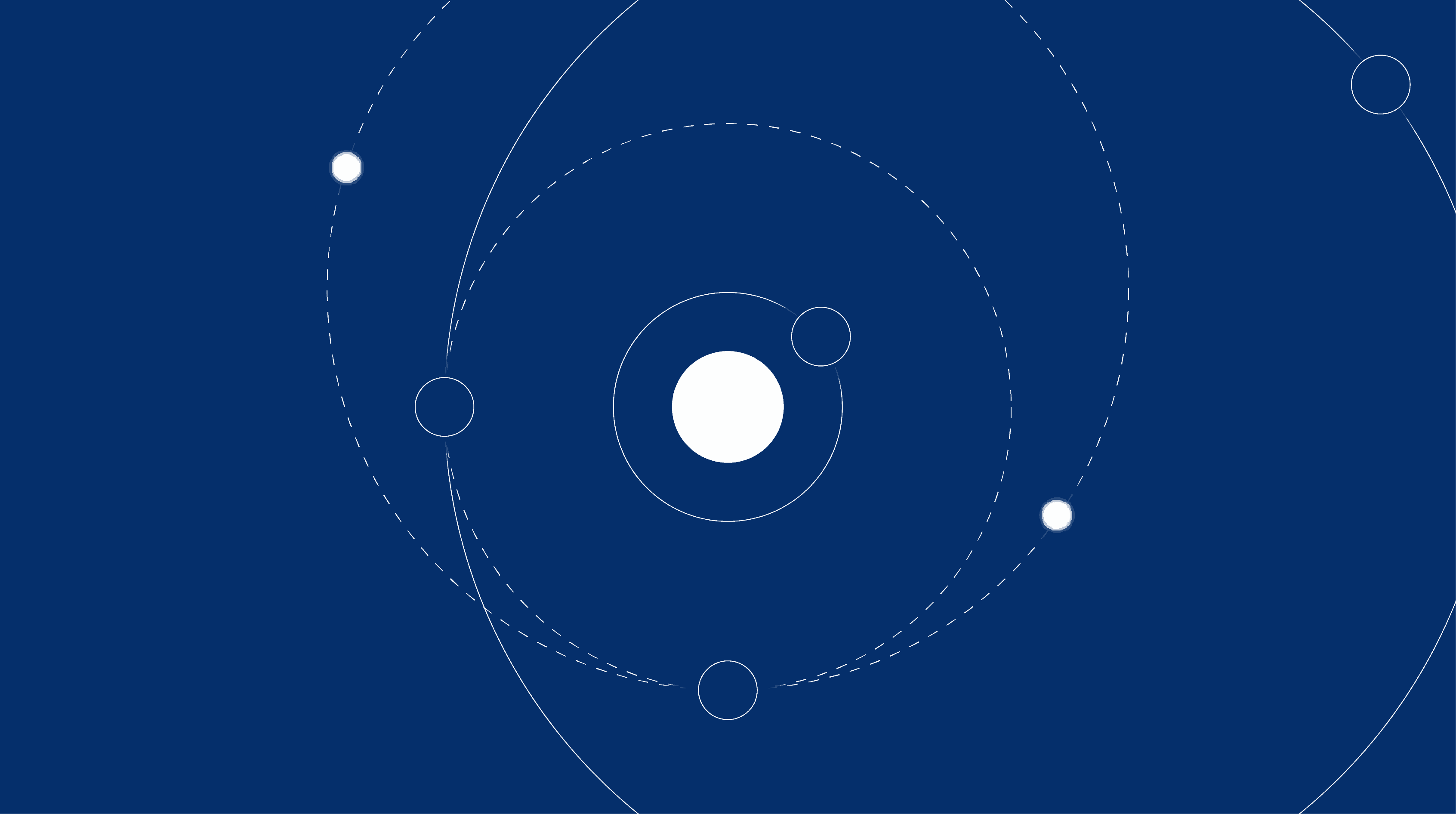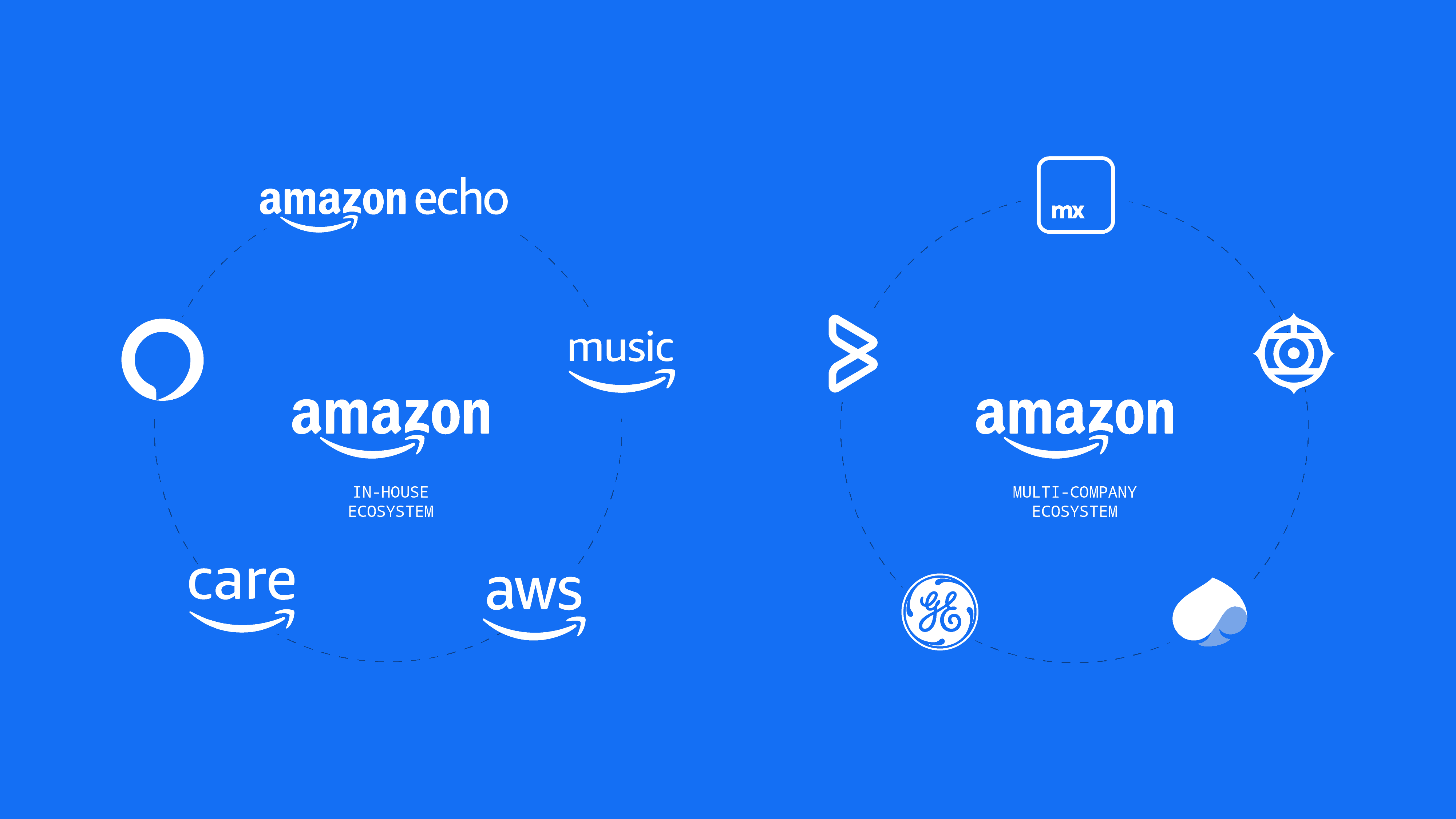Digital Ecosystems 101: How to Deliver Value & Drive Growth

From chimpanzees in Africa to businesses in Zurich, we all depend on an ecosystem to survive.
For businesses, digital ecosystems are a technological evolution of a natural ecosystem. While our chimp relatives and other species are dependent on Mother Nature, companies are ensuring their survival by creating strategic digital ecosystems in which they collaborate in order to better serve their customers.
What is a digital ecosystem?
A digital ecosystem is a network of partners, technology resources, data, and customers.
Our Chief Ecosystem Solutions Officer, Jethro Borsje, defines an ecosystem as, “a dynamic and growing set of relationships between different companies with the goal to jointly create value for their mutual customers.”
The keywords in his quote are jointly and mutual. Digital ecosystems are founded on mutually beneficial relationships, and partners work together toward a common goal: To deliver as much value as possible to their customers.
It’s a tried-and-true digital business strategy. Six out of the top seven most valuable companies in the world (Apple, Microsoft, Amazon, Alphabet, Facebook, Alibaba) owe their ongoing success to digital ecosystems.
But massive enterprises aren’t the only ones benefiting. There are a variety of ecosystems with opportunities for companies across many industries. In fact, digital ecosystems are growing exponentially. It’s projected that sales through this strategy will surpass $50 trillion by 2025.
Examples of digital ecosystems
Think of a digital ecosystem as an evolution of a natural ecosystem. In the Amazon Rainforest, networks of animals, plants, trees, and insects play essential roles in their environment. Together, they make the ecosystem stronger than the sum of its individual parts.
Now consider the other Amazon. Amazon.com, Inc. started as an online bookseller and now has a thriving in-house digital ecosystem. Some of their connected products include:
- Amazon Web Services (AWS)
- Amazon Prime
- Amazon Music
- Amazon Alexa
- Amazon Care
- Amazon Echo
The list goes on and on, and all of these products live in the same Amazon digital ecosystem.

Amazon also has a multi-company digital ecosystem with other organizations, including Mendix.
For example, AWS and Mendix built a strong partnership centered around a mutual customer base.
Developers were using Mendix to build business apps, and AWS cloud services to power those apps. Recognizing the benefits of merging solutions, Mendix now enables users to build apps tightly integrated with AWS out of the box. AWS makes this easy by offering Mendix via their marketplace.
There are benefits for everyone here:
- Mendix benefits from visibility on the AWS Marketplace.
- AWS has an advantage over other cloud providers with visibility through Mendix.
- Customers gain more value from faster and easier processes and integrations.
3 benefits of digital ecosystems
A healthy digital ecosystem creates an bounty of benefits. By leveraging your partners and shared resources, your company can increase agility, lower costs, and open up new revenue opportunities.
1. Propel digital transformation
At this point, digital transformation for a business is as necessary as breathing is for humans.
If your in-house operations and tools are inefficient, it could cost you your partnerships, make you fall behind the competition, and leave you unprepared to face future disruptions.
Building a digital ecosystem is a great way to kick off or further execute digital transformation. It forces businesses to assess their existing processes, partners, and technology landscape.
Throughout the process, you can introduce automation, experiment with AI, and modernize legacy systems. All efforts are beneficial whether you have a digital ecosystem or not.
These optimizations will streamline processes and give your company more time to focus on digital innovation.
Rest assured, the upgrades you make during your ongoing digital transformation will lay the foundation for a robust digital ecosystem.
2. Create new revenue streams
According to Gartner, successful digital ecosystems see exponential growth and higher profits (27% to 32% higher) than industry averages.
The key to success is data.
When companies partner in a digital ecosystem, the amount of data increases exponentially. And more data means more opportunities to better understand your customers.
With data insights and shared resources from your partners, you can increase value for your customers by:
- Accessing an untapped customer pool
- Enhancing existing products and services
- Generate new products and services (aka new sources of revenue)
3. Lower operational costs
This is where your digital transformation initiatives really pay off. Integrating digital technologies into your business processes helps increase efficiency and reduce costs by:
- Automating manual tasks
- Reducing errors
- Optimizing workflows
Partnerships help companies lower new customer acquisition costs. With data from your partners, you can access a wider customer base without a huge marketing budget. Your partners can also provide value to your customers, thereby making your company more relevant.
4 key characteristics of a healthy digital ecosystem
There are four essential characteristics that all healthy digital ecosystems have in common. As you assemble your ecosystem, make sure to use these as a guide.
1. Symbiotic
Symbiotic relationships are the foundation of all digital ecosystems. We can dream of a world with corporate altruism, but the reality is that your partnerships must be mutually beneficial.
There has to be something in it for everyone. Otherwise, it will be difficult—if not impossible—to build and maintain thriving partnerships.
Relationships with partners are important. If one part of an ecosystem fails—maybe a partner isn’t pulling their weight, or the technology isn’t up to par—there will be ripple effects.
2. Customer-centric
Building a digital ecosystem is about creating more value for your customers. To do this, you need to think beyond offering personalized marketing campaigns and exceptional customer service.
A customer-focused digital ecosystem considers every step of the customer journey, including back-end operations and partner collaboration.
Everyone in your digital ecosystem should follow a unified value proposition. And your customers need full access to all of your products and services via a single access point.
3. Adaptable and scalable
A successful digital ecosystem is able to respond quickly to economic and global changes. This could include anything from shifting demands for certain products to completely rethinking a business model.
One of the advantages of digital ecosystems is that your company doesn’t have to face certain challenges alone.
Remember COVID-19 when businesses had to adapt overnight? The companies that were part of a digital ecosystem adapted better than those without. Why? Because they could lean on their partners and shared resources to quickly adjust business models.
Your digital ecosystem partners can also help your company scale. Working with companies that offer complementary services makes it easier and faster to introduce new products that create value for your mutual customers.
Digital ecosystems should also have a global footprint. The average ecosystem typically has partners in five locations, and the most successful digital ecosystems cover 10 or more countries.
If you limit your ecosystem to one country or one part of the world, you—and your customers—could miss out on the full scale of benefits.
4. Data-focused
There’s no lack of data in an integrated digital ecosystem. But if your data processes are bad, future partners may not be open to sharing.
McKinsey states, “Any business that lacks advanced analytics capabilities will struggle to remain relevant.”
That’s why your digital transformation initiatives should focus on optimizing how you gather, store, and manage that data.
The more partners you have, the more shared data you’ll have. So it’s important to have data that is always accurate, readily available, and secure.
Together with your partners, you can use this data to identify opportunities to create or enhance products and services.
5 types of digital ecosystems
There are various types of digital ecosystems. Some are defined by the number of partners involved, and others by what they offer. Since no two digital ecosystems are the same,
1. In-house digital ecosystems include a single company that provides a suite of connected products. Amazon Alexa, Amazon Music, and AWS are an example.
2. Multi-company digital ecosystems include at least two or more companies that partner to offer a wider range of products or services. For example, AWS and Mendix.
3. Functional digital ecosystems are the simplest model. They are created specifically to support an existing product or service.
For example, in the automotive industry, it’s common to see partnerships in the manufacturing supply chain.
4. Platform ecosystems provide a common platform where all connected companies can work and collaborate together. For example, HubSpot and Salesforce.
5. Super platform ecosystems are the most complex model. They connect several platforms spanning various industries and help create a wide range of customer journeys.
A virtual assistant, as TechTarget explains, is a good example because it merges shopping, payments, transportation, and communication services.
How does a digital ecosystem work?
A digital ecosystem is driven by people and technology. It should consist of the following broadly defined business roles. The role(s) your business assumes will depend on the product or service being offered.
- Orchestrators manage supply and demand and make it possible for others to participate in the digital ecosystem.
- Producers include those that create value with core products or services that are targeted toward consumers, businesses, buyers, and sellers.
- Consumers are those who gain value from the digital ecosystem. Consumers can also be producers.
As for the technology part, managing an ecosystem and keeping everyone connected also requires:
- Project management tools
- Customer engagement and relationship management tools
- Mobile apps, public social media channels
- Knowledge management platforms
- Collaborative software development platforms
How to find partners
As you’re building your digital ecosystem, look for partners that complement your strengths, fill your gaps, and share your vision.
Your digital ecosystem should only include partners that fit with your business model, values, and goals.
Start building your digital ecosystem
Ready to assemble your partners? Whether your company’s goal is to extend the core business or improve operational efficiency, start by assessing current market trends to see where your business may fit in.
Remember that a digital ecosystem isn’t built overnight. It’s taken Mendix many years to strategically build a robust digital ecosystem so that we can offer as much value as possible to our customers.
As we become a more composable enterprise, our goal is to share these attributes with our customers so they can also create their own thriving digital ecosystems.
Frequently Asked Questions
-
How do digital ecosystems improve the customer experience?
Digital ecosystems enhance customer experiences by offering seamless integration across services, personalized interactions, and expanded value propositions.
They provide one-stop solutions, reducing friction and increasing convenience. By leveraging partner strengths, ecosystems deliver more comprehensive and innovative offerings, meeting diverse customer needs efficiently.
-
What tools are essential for managing a digital ecosystem?
Essential tools for managing digital ecosystems include API management platforms, data analytics suites, and collaborative workflow systems.
Cloud infrastructure, integration middleware, and partner relationship management software are crucial. Real-time monitoring tools and AI-powered predictive analytics help optimize ecosystem performance and identify growth opportunities.
-
What factors should be considered when choosing digital ecosystem partners?
When selecting ecosystem partners, consider strategic alignment, technological compatibility, and complementary capabilities.
Evaluate their market reputation, financial stability, and innovation potential. Assess data sharing policies, scalability, and regulatory compliance. Look for partners who enhance your value proposition and bring unique strengths to the ecosystem.
-
What technologies are essential for building a digital ecosystem?
- APIs for integration
- Cloud for scalability
- iPaaS for connecting systems
- DevOps for automation
- AI for smart features
- Microservices for modular apps
- Security for data protection
